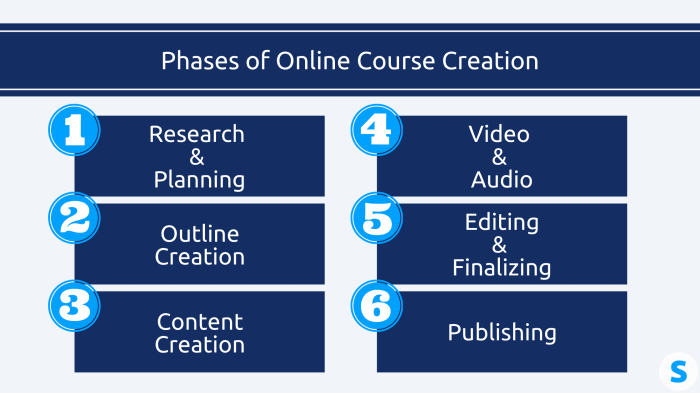Online Course Creation sets the stage for this enthralling narrative, offering readers a glimpse into a story that is rich in detail with american high school hip style and brimming with originality from the outset.
Embark on a journey through the world of online course creation, where educators and learners alike dive into the realm of digital learning with creativity and purpose. From planning impactful courses to engaging learners with interactive content, this guide will explore the dynamic landscape of e-learning.
Introduction to Online Course Creation
Online course creation is the process of designing and developing educational courses that can be accessed and completed entirely over the internet. This method of learning has gained popularity due to its convenience and accessibility, allowing students to learn at their own pace and from anywhere in the world.
Creating high-quality online courses is essential to engage students effectively and provide them with valuable learning experiences. By incorporating interactive multimedia elements, clear learning objectives, and assessments, educators can ensure that their online courses are engaging and informative.
Importance of Creating High-Quality Online Courses
Offering high-quality online courses benefits both educators and learners in various ways. For educators, it provides an opportunity to reach a wider audience and expand their teaching capabilities beyond traditional classroom settings. By creating online courses, educators can also generate additional income streams and establish themselves as experts in their field.
Benefits of Offering Online Courses
- Flexibility: Online courses allow learners to study at their own pace and convenience, fitting their learning around other commitments.
- Accessibility: Online courses can be accessed from anywhere with an internet connection, making education more inclusive and reaching a global audience.
- Cost-Effective: Offering online courses can be a more affordable option for both educators and learners, eliminating the need for physical resources and travel expenses.
- Personalized Learning: Online courses can be tailored to individual learning styles and preferences, providing a personalized learning experience for each student.
- Continuous Learning: Online courses enable learners to continue their education and professional development without interrupting their daily routines.
Planning and Research for Online Course Creation

When it comes to creating an online course, the initial steps of planning and research are crucial to its success. Understanding your target audience and their needs, as well as selecting the right course topic, are key factors in developing a course that resonates with learners.
Identifying the Target Audience and Their Needs
To start planning your online course, conduct thorough research to identify your target audience. Consider factors such as demographics, interests, and skill levels to tailor your course content accordingly. Engage with potential learners through surveys, interviews, or online forums to gather insights into their learning preferences and needs. By understanding who your audience is and what they are looking for in a course, you can create content that is relevant and engaging.
Choosing the Right Course Topic
When selecting a course topic, it’s essential to consider both market demand and your expertise. Conduct market research to identify trending topics or areas with high demand for online courses. Evaluate your own knowledge, skills, and experiences to determine a topic that aligns with your expertise and passion. By choosing a topic that is in demand and aligns with your strengths, you can create a course that attracts and retains learners effectively.
Content Development Strategies

When creating an online course, it is crucial to consider the different content formats that are suitable for engaging and educating your audience. Structuring your content effectively can significantly impact the learning outcomes of your course. Additionally, incorporating multimedia elements such as videos, quizzes, and interactive activities can enhance the overall learning experience for your students.
Types of Content Formats
- Video Lectures: Delivering content through video lectures can help keep learners engaged and make complex topics easier to understand.
- Text-Based Modules: Providing written content in the form of articles, eBooks, or PDFs can offer a comprehensive overview of the subject matter.
- Interactive Quizzes: Including quizzes throughout the course can reinforce learning and help students assess their understanding of the material.
- Discussion Forums: Creating a space for students to interact and discuss course topics can foster a sense of community and collaboration.
Structuring Content Effectively, Online Course Creation
- Organize content logically: Arrange your content in a clear and sequential manner to help students follow along easily.
- Use headings and subheadings: Break down your content into sections with descriptive headings to improve readability and navigation.
- Incorporate multimedia: Supplement text-based content with images, videos, and infographics to cater to different learning styles.
- Provide summaries: Summarize key points at the end of each module to reinforce learning objectives and help students retain information.
Importance of Multimedia Elements
- Videos: Visual demonstrations can enhance understanding and engagement, making complex concepts more accessible.
- Quizzes: Interactive quizzes can assess comprehension and reinforce learning, providing instant feedback to students.
- Interactive Activities: Engaging students through interactive elements like simulations or games can increase motivation and retention of course material.
- Infographics: Visual representations of data or concepts can simplify complex information and aid in retention.
Engaging Learners in Online Courses
In order to keep learners engaged throughout an online course, it is important to utilize various strategies that promote active participation and interaction. This can enhance the learning experience and increase retention rates among students.
Role of Discussion Forums
Discussion forums play a crucial role in engaging learners by facilitating peer-to-peer interaction and collaborative learning. Encourage students to participate in discussions, ask questions, and share insights to foster a sense of community within the online course.
Live Sessions
Live sessions provide an opportunity for real-time engagement with instructors and classmates. These sessions can include lectures, Q&A sessions, group activities, and guest speakers to create a dynamic learning environment. Encourage students to actively participate and ask questions during live sessions to enhance their understanding of the course material.
Assignments for Engagement
Assignments are a great way to promote engagement by allowing students to apply their knowledge and skills in a practical context. Include a variety of assignments such as quizzes, projects, case studies, and group assignments to cater to different learning styles and preferences. Provide timely feedback on assignments to keep students motivated and engaged throughout the course.
Platforms and Tools for Online Course Creation
Creating an online course requires the right platform and tools to effectively deliver content to learners. Let’s explore popular online course platforms, the benefits of learning management systems (LMS), and essential tools for content creation, video editing, and assessments.
Comparison of Online Course Platforms
- Udemy: A widely recognized platform with a large user base, offering a variety of courses on diverse topics.
- Teachable: Known for its user-friendly interface and customization options, allowing instructors to create branded courses.
- Coursera: Collaborates with universities to provide high-quality courses, offering certifications and specializations.
Benefits of Learning Management Systems (LMS)
- Centralized platform for course organization, delivery, and assessment.
- Allows for tracking student progress and performance through analytics.
- Facilitates interactive learning experiences with features like discussion forums and quizzes.
Choosing the Right Tools
- Content Creation: Tools like Canva, Adobe Spark, and PowerPoint for creating engaging visuals and presentations.
- Video Editing: Software such as Adobe Premiere Pro, Camtasia, or iMovie for editing and enhancing video content.
- Assessments: Platforms like Google Forms, Quizlet, or Kahoot for creating interactive quizzes and assessments.